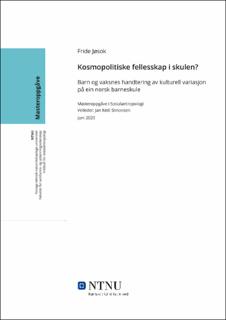| dc.contributor.advisor | Simonsen, Jan Ketil | |
| dc.contributor.author | Jøsok, Fride | |
| dc.date.accessioned | 2021-09-28T18:43:15Z | |
| dc.date.available | 2021-09-28T18:43:15Z | |
| dc.date.issued | 2020 | |
| dc.identifier | no.ntnu:inspera:56113480:11205036 | |
| dc.identifier.uri | https://hdl.handle.net/11250/2785610 | |
| dc.description.abstract | Denne teksten er basert på eit etnografisk feltarbeid utført på ein barneskule i Trondheim. Skulen er ein mottaksskule, som gjer den særskilt mangfaldig når det kjem til etnisitetsrelaterte kulturtrekk som språk, utsjånad, religion og nasjonal tilknyting. Eg utforskar her kva for skilnadar barna gjer sosialt signifikante i samhandling innan deira «peer groups» i friminutta, og kva for skilnadar som bevissgjerast for barna gjennom deira samhandling med lærarar og andre tilsette. I dei fleste tilfelle verkar skilnadar som har med utsjånad, religion og nasjonal tilknyting å vere lite relevante i og for barnas samhandling på skulen, medan språklege skilnadar av og til dukkar opp som signifikante på ulike måtar. Den sosiale signifikansen av språklege skilnadar vil difor vere eit viktig tema i denne teksten.
Dei tilsette ved skulen har det eg har valt å kalle for ein kosmopolitisk pedagogisk praksis, som inneberer at dei snakkar om det kulturelle mangfaldet på skulen på ein open og eksplisitt måte framføre barna, og dei forsøker å skape eit fellesskap mellom barna basert på skilnadane mellom dei. Dette skil seg frå det sosialantropologar har dokumentert frå norske skular på starten av 2000-talet, og ein viktig del av denne teksten vil vere å samanlikne funna mine med desse tidlegare bidraga. Eit av hovudargumenta mine er at skilnadar ikkje ser ut til å bli mindre sosialt signifikante for barn dersom vaksne unngår å snakke om dei – noko mange ser ut til å ha trudd – men kanskje snarare tvert i mot.
Situasjonen på skulen vil vidare sjåast i lys av diskursen om innvandring og kulturskilnadar i Noreg dei siste tiåra, med mål om å vise korleis det som skjer på skulen kan seiast å vere forankra i ein vidare meiningsdiskurs i det norske samfunnet. Dagens diskurs om innvandring beskrivast ofte som polarisert, og eg argumenterer for at dei tilsette ved skulen har haldningar som befinn seg innan den innvandringsliberale – eller kosmopolitiske – polen i denne polariseringa. Haldningane til dei tilsette kan vidare seiast å ha innverknad på korleis dei føreheld seg til barna i skulekvardagen, og eg argumenterer for at barna difor erfarer uttrykk, haldningar og handlingar som kan seiast å vere forankra i det polariserte ordskiftet om innvandring og kulturskilnadar. | |
| dc.description.abstract | This text is based on ethnographic field research conducted at a primary school in Trondheim. The school is a «reception school», receiving newcomers for language training, which makes it especially diverse when it comes to ethnicity related cultural traits like language, appearance, religion and nationality. I question which differences the children themselves make significant in their everyday interaction in their peer groups in the schoolyard, and which differences are made evident to the children by other actors in the school context. In most instances, the children find differences of appearance, religion and nationality rather irrelevant. Language differences on the other hand, sometimes emerge as significant. The social significance of linguistic plurality is, therefore, an important topic in the text.
The teachers and the school management have what I have conceptualized as a cosmopolitan pedagogical practice, which means that they explicitly and openly talk about the cultural diversity in front of the children and try to create community between the children based on the differences between them. This differs from what social anthropologists have documented from Norwegian schools at the start of the 21st century. Comparing my findings with these earlier contributions will be an important part of this text. One of my main arguments is that – on the contrary to what many people seem to believe – differences do not seem to become less socially significant for children by grown-ups avoiding talking about them. It might actually lead to the opposite.
The situation at the school will also be seen in the light of the discourse about immigration and cultural differences in public debates in Norway today and in the past tens of years, with the goal of showing how what happens in school is embedded in further systems of meaning in Norwegian society. Today’s discourse about immigration is often described as being polarized, and I argue that the teachers and the school management have attitudes that place them in the immigration liberal – or cosmopolitan – pole in this polarization. Further, their attitudes have an impact on how they relate to the children in everyday life at school, and I argue that the children therefore experience expressions, attitudes and actions that can be said to be embedded in the polarized public debates on immigration and cultural differences. | |
| dc.language | | |
| dc.publisher | NTNU | |
| dc.title | Kosmopolitiske fellesskap i skulen? Barn og vaksnes handtering av kulturell variasjon på ein norsk barneskule | |
| dc.type | Master thesis | |
